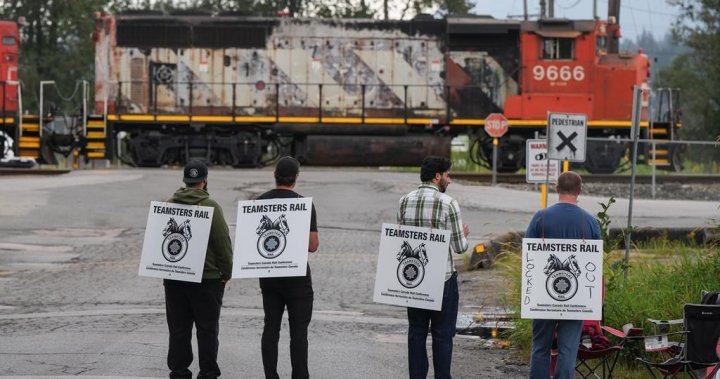A national grain growers association estimated the railway labour dispute is costing farmers between $40 million and $50 million a day. A city councillor says the stoppage has disrupted the daily lives of residents.
“We’re going to have to talk to our banks and talk to our creditors and say, ‘Hey, you know what I thought I could do? I can no longer do it,’” Grain Growers of Canada Chair Andre Harpe told Global News.
“It’s not been a pleasant experience for anyone,” Maple Ridge, B.C. councillor Ahmed Yousef said.
Concern and frustration continues to grow as Canadian Pacific Kansas City (CPKC) trains aren’t running and with Teamsters at the other country-wide railway, Canadian National, set to strike on Monday.
Labour Minister Steve MacKinnon previously said he will impose final, binding arbitration to end the dispute and to “secure industrial peace”. The Canada Industrial Relations Board, a mediating agency, could issue a decision as soon as Saturday.
But the union for all rail workers, Teamsters Canada Railway Conference (TCRC), said they are looking at all options and that the picket lines will stay up.

Harpe said a stoppage now is “particularly bad” for the agricultural sector because most farmers have started harvesting.

Get daily National news
Get the day’s top news, political, economic, and current affairs headlines, delivered to your inbox once a day.
He said many farmers have contracted their grain to be sold as soon as they can — and that “usually we don’t have enough storage, we don’t plan on storing our crops,” he said, speaking from Alberta.
“Basically, our income has stopped until (the Teamsters) actually go back to work and the rail companies are actually running full steam.”
Further west, Maple Ridge, B.C. councillor Ahmed Yousef said the West Coast Express commuter train uses CPKC rails, and so it isn’t running. He says it has been a “disruptor” to the residents who work outside of the city.
Maple Ridge is part of Metro Vancouver.
“We’ve seen significant uptick in congestion on the roads,” he said.
“Our community has been underserved for, I would say, a little over a decade now,” he added, going on to say he hopes the situation will prove they need more service.
Toronto Metropolitan University economics professor Eric Kam said roughly 32,000 people commute in Vancouver, Montreal and Toronto.
He also stated, on the Roy Green show, that farmers won’t be able to get 75 per cent of their fertilizer.
“We’re going to get a sort of consumer hoarding, and people are going to start to go out and buy out whatever they can find at whatever prices they can find,” Kam said.
Referencing the 2023 13 day-long B.C. port strike that the Port of Vancouver estimated cost $800 million per day — for a total of $10 billion — Kam suggested a long rail shutdown could cost Canada up to $3 billion in GDP.
It also hurts Canada’s reputation, he added.
“This could be just one of those pieces of evidence that Trump needs to trade less with Canada.”
McGill University associate sociology professor Barry Eidlin said a number of converging long-term trends led to the Canada-wide dispute.
The first, he told Global News, was stagnating wages, eroding benefits and decreasing job security that, in turn, was “crystallized” by the COVID-19 pandemic.
“The idea of these workers being hailed as essential (during the pandemic) but then treated as disposable really rubbed people the wrong way,” he said.
A tighter labour market after the pandemic gave workers greater bargaining power, Eidlin said.
“As these strikes started increasing, there was a bit of a contagion effect where we had workers looking at what was going on and saying, ‘Oh, if they can do that, then maybe we can do that, too.’”
Eidlin, speaking generally of collective bargaining in recent years, said another factor was “heightened expectations.”
“One of the things that we’ve seen in a lot of these strikes is that they’re the result of members rejecting contracts that have been negotiated by the union’s leadership and sending the negotiating committee back to the bargaining table.”
But forcing sides back to the table can “reduce the incentive of the employer to come to an agreement.”
“When you force an end to negotiations through binding arbitration or back-to-work legislation, you short-circuit the collective bargaining process.”
— with files from Caryn Lieberman, Uday Rana, Amy Judd, Alissa Thibault and The Canadian Press
© 2024 Global News, a division of Corus Entertainment Inc.





